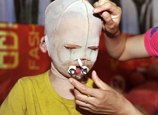
NANNING, June 3 (Xinhua) -- A legislation requiring real-name registration for HIV testing in south China's Guangxi Zhuang Autonomous Region has drawn criticism from experts and AIDS patients despite officials' promises to protect patients' privacy.
Zhang Jinxiong, an AIDS patient and founder of Rainbow China, a non-governmental organization that engages in AIDS prevention and the promotion of gay rights, believes the policy will not serve to curb the spread of the virus.
"In a society where discrimination against HIV carriers is rampant, real-name testing will scare away potential patients because they will be afraid of breaches of privacy," he said.
Guangxi's regional government passed a regulation last Thursday stipulating that anyone who wishes to have an HIV test must provide their personal information to testing agencies.
Effective starting from July 1, the regulation requires those who test positive to warn their spouses or partners. It also forbids any attempt to make such information public without the consent of patients or their custodians.
Fan Xiaohui, an official from the standing committee of the People's Congress of Guangxi, said the information can help doctors contact those test positive, inform them of their infections and provide professional advice in a timely manner.
Medical experts and officials said many testees, out of ignorance of the disease, tend to "disappear" after learning they are HIV positive. A lack of information prevents doctors from reaching out to convince them to receive medical treatment and adopt protective measures.
"It will also provide a more accurate record of the AIDS situation in Guangxi, which will contribute to future policymaking regarding AIDS control and prevention," Fan added.
But Zhang was skeptical of the policy, saying that real-name registration will do more harm than good.
"Under the new policy, many people may not visit the agencies at all out of fear of exposure and resort to self-testing, which is not accurate. This will create great anxiety among those who test positive using the self-tests, as they have no one around to give professional advice," he said.
His views were echoed by Jing Jun, a sociology professor at Tsinghua University.
Some provinces and regions in China have adopted real-name HIV testing in the past, Jing said, adding that such policies have proven ineffective.
"There is also the problem of possible information leaks, which may do great damage to the patient's family or interpersonal relations," Jing added.
China currently offers HIV tests without requiring personal details from testees. But some HIV-ridden provinces and autonomous regions like Yunnan and Guangxi have adopted real-name testing policies out of disease prevention and control considerations.
Zhang Beichuan, a prominent sexologist, said the policy is more about making it easier for government officials to handle HIV/AIDS-related issues than providing better services for HIV carriers and AIDS patients.
"The government should consider the opinions of those susceptible to the disease before they pass regulations," he said.
But Zhang added that he supports real-name registration for those who test positive and return for a second visit to clinics, explaining that this will help medical practitioners reach out and offer help to those infected with HIV.
Zhang said he believes the key to AIDS prevention and control lies in improving education among the general public.
"Educating people about AIDS prevention and control is the only way to eliminate deep-rooted fears and prejudice among the public," he said.
















 Photo story: Mask girl's hard life
Photo story: Mask girl's hard life


![]()
